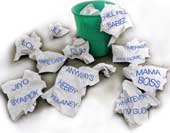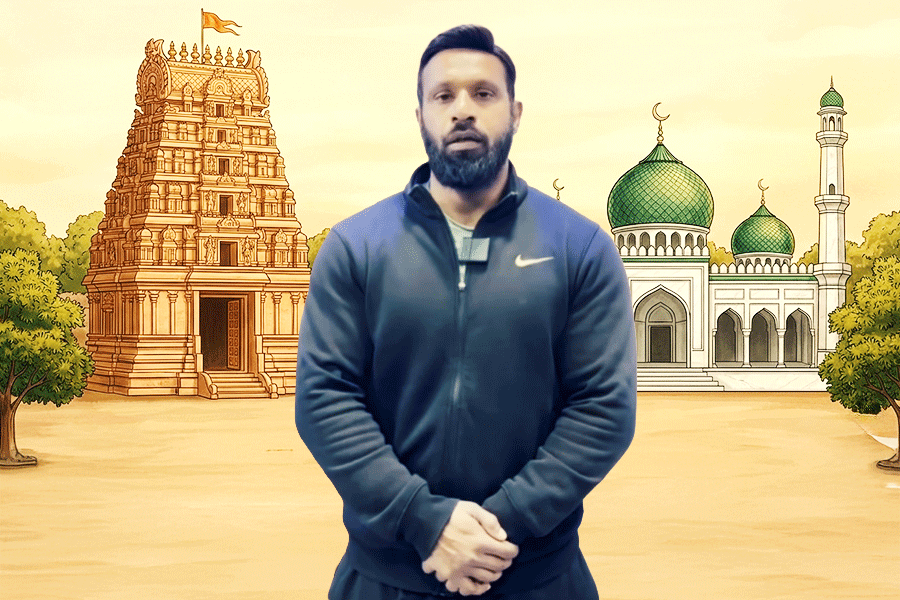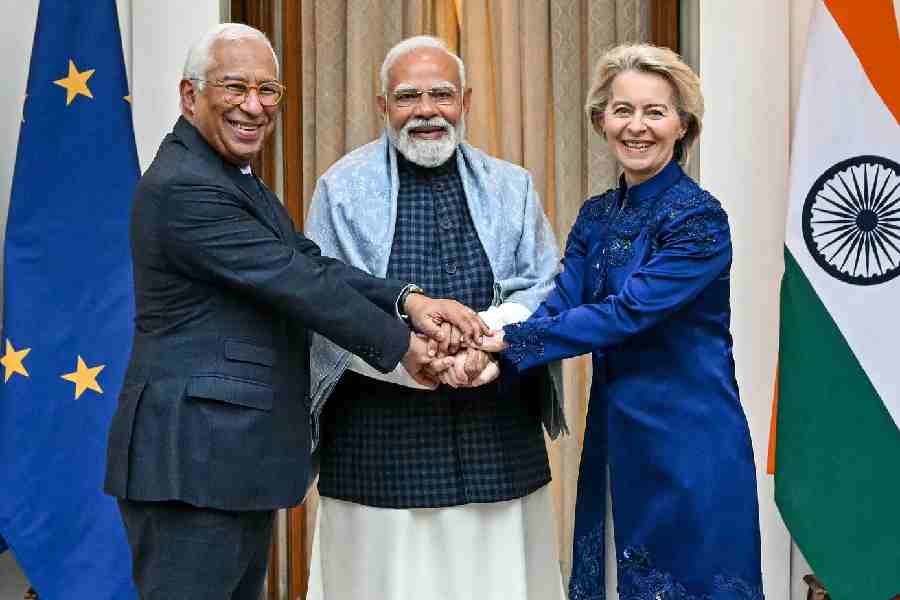 |
| RAINBOW REVELRY: Night-riders chill at Calcutta hotspot. Picture by Rashbehari Das |
50. Hebby: Might have started with the Bengali word “bhari”, which means “very” and also “heavy”. The latter morphed into “hebby” in camp Bengali. Now it is about as overused as a former Bollywood dancing hero’s face, and as redundant. “Hebby gets on my nerves because it sounds so crass,” says Ronit Maitra, business analyst, 24.
49. Freak out: Originally it meant losing one’s nerve. Now it means letting down one’s hair, especially on the dance floor. Which ends up looking like an attack of the nerves sometimes.
48. Byapok: Originally a tatsama (same as Sanskrit) word, meaning large in scope. Now means awesome. Used by every college-goer over the past two decades, 17 times daily. Some have kept using it later. But what is so awesome and so frequent? Loadshedding?
47.Awesome: English counterpart of byapok. Pronounced “aussssssum”. Nearly everything can be awesome. Says Chandni Chatterjee, 27: “I hate how it has become the only adjective that my sister uses.”
“Ummazing” (amazing) and “havoc korechhish” and “phatiye diyechhish” (both meaning you have done something huge) serve the same purpose.
46. Kelaney: The original Bengali word meant peeling a fruit, for example a banana, says lexicographer Ashok Mukhopadhyay. “Now it means a grinning idiot,” he adds. Overused, has an offensive edge. Probably the reference to exposed teeth does it.
“I don’t have that much of a problem with byapok but kelaney bothers me. Kothata boddo nimno ruchir (in bad taste). Utpal Dutt said ‘daant kelano Bancharam’ in a movie, but that was funny. What is this new obsession with taking up words that have always been thought of as crass?” asks Sushmita Banerjee, 47.
45. No worries: Means precious little. It is cold and emotionless, said just for the sake of saying something. “I hate it when someone says ‘no worries’ with a smile on his face without even understanding the situation,” says Anu Mukherjee, homemaker.
44. Eggjactly: It was hilarious when Javed Jaffrey said it first in Salaam Namaste. Now it’s just bad spelling.
43. Warm regards: Aren’t regards quite enough?
42: Jiyo: Means great going, or well done. Its rude loud chorus shakes you up when someone in the Indian team hits a six or gets a wicket.
41. Boss: The regional equivalent of “dude”. But said with a swagger it means “Anything you can do I can do better.”
40. K: Even ok was shortened. Imagine running to read your text to find the letter “k”. We rest our case.
39. Mama, kaka: The Bengali equivalent of “yo man”. “Mama” makes the blood boil when pronounced like “mawa”, with a nasal “w”.
38. I’m gud: Status quo specialist, which means lazy with a love for Americanism. Example: A: “Do you want to go out tonight?” B: “Nah I’m good.” Whatever happened to “No, thank you”?
37. Absolutely: “People tend to use the word when they aren’t absolutely sure,” says Ronit Maitra, 24, business analyst. Absolutely!
36. What the f***!: Urban Dictionary, a website, says the expression was first coined in the 1983 movie “Risky Business” when Curtis Armstrong’s character kept exhorting Tom Cruise’s to throw caution to the wind with the phrase. In an Indian city people use it because extreme English gaalis are cool in a way Bengali or Hindi gaalis are not. “I bet 95 per cent just think it sounds cool,” says Rohit Ghosh.
35. Holy crap: Same as WTF.
34. No way: How about a plain and simple no?
33. At the end of the day: Just six extra words.
32. Anyhow: Meaning?
31. Anyways: Once, it would have been grammatically incorrect. Today, it is cool!
30. Hmm: A popular response to people you’re not listening to.
29.Smileys: :-( , X-( , :-*, :-‘(... signs of the times. Language has broken down in a fit.
28. XO: Hugs and kisses, where X stands for kiss and O, for hugs. Who figured it out?
27. JLT: Acronym for Just Like That. You can do anything, JLT. Really?
26. Gross: Disgusting. But “disgusting” is such a long word.
25. Poor baby: “Fake,” feels Mandira.
24. Awww: American exclamation that denotes “something is cute/sweet/touching/whatever”, says Urban Dictionary. Debolina hates it because it’s coy.
23. Ewww: The Bengali “ish” got replaced with “yuck” and “yuck” with “ewww”. That is the way evolution works.
22. Arre yaar: An uncool and wannabe expression. Period.
21. Lol: “Laugh out loud”. But probably the writer says it when he has nothing more to say.
20. Yo: Originated in Afro-American and Italian-American Philadelphia. “But now used by pseudo-cool people/all over the world,” says Pratyush Singh, a doctor.
19. Cool: “I think there is a kind of indolence in the way the upper middle class youth use the word. Everything is cool for them,” says a visitor to the city.
18. Take care: It is so sweet, it might just give you diabetes, but is it necessary warning every time you go down for a glass of water, or smoke, or to the bathroom?
17. Dear/darling: Especially irritating when used by people who hug everyone and kiss the air. The Bollywood equivalent is darling, if not the super-affected “dahling”.
16. You know: If we did, would we be waiting for you?
15. Shuddup, or Shut up: Pronounced with the stress on “up” and followed up with a gentle shove on the shoulder or chest. It is as much annoying as it is everywhere.
14. Mindblowing: Producing hallucinatory effects/ intensely affecting the mind or emotions. “I come across at least one mindblowing book/ novel/ song/ film/ advertisement every day. Once it was a hand-sanitiser,” says Debolina. Tune in to Mindblowing Mahiya.
13. Loser: Most people call others losers just to feel good about themselves.
12. Duh: An insult that is meant to be a copy of the sound made by a mentally challenged person. What kind of mental health is this?
11. Literally: An overused adverb, often used for emphasis. Kristin Stewart, who acted in the film Twilight, said: “I get to do something that literally if I didn’t get to do, I would implode.” One can’t “literally implode”, which would involve collapsing inward into your own personal black hole and disappearing. But one generates unconscious irony: “literally” is used to mean metaphorically. The exact opposite of literally, literally.
10. Type/types: She’s the babe type is too much. She’s a babe is enough, if she isn’t too much. Same applies to “like”, as in “He is like totally cool”.
9. Totally: A word that could mean everything, but means nothing. “Or it means the user has poor language skills,” says Somini Sen Dua, an entrepreneur.
8. Yaa: Yes, a word English teachers would frown upon. The critics have been far outnumbered.
7. Timepass: Passing the time in doing nothing, in India. The implication is that time sits heavy on you unless you pass it quickly. Like you pass the parcel.
6. Babes/babez: “My colleague in office addresses every girl as babes. Sometimes she goes a step forward to call us all babesy. I hate it,” says Meenakshi Mukherjee, a 28-year-old.
5. Whatever, or Wateva: It has topped the list of annoying words in the US too.
4. Dude: Everyone is a dude — from your father to your doodhwala, or the office peon. Because everyone is potentially American.
3. Relax: “It makes me edgy to hear people say ‘relax’ all the time. As if I am some sort of a hypochondriac who needs to be soothed down,” explains 23-year-old Ranjani Das. In Bengal, people need to do it less.
2. Take a chill pill: An evolved form of chilling out. Sounds like all your worries can be wished away if you just gulp down something and do a pop bhangra. The rhyme hurts.
1. Chillax: It is the strangest word. It’s more than just a blend of chill out and relax. It is out of this world. Is it from the Ice Age? From Mars? One definition even traces it to being first used by a “teenage elder sister to her overly ebullient younger siblings”.
Or does it come from a city shopping complex? When a multiplex opened there, the place was plastered with the word. The multiplex never took off, but “Chillax” stayed on.
Chillax is the climax.
Characters or assassins?
A mobile service provider is launching an SMS that will enable customers to pay per character. Called Diet-SMS, the service will charge only 1 paisa per character. For some reason the company will not charge for space between words.
This is another encouragement beyond words to go for, in textese, txt, txtspk, txtk, txt talk or texting language, size zero words. It can be a liberating experience, for the user, and perhaps for the words too. They will be pared down to their skeletons, or to initials.
Having reduced so much, language will look different, younger, fresher.
For example you are trying to date a girl and are afraid to ask her out in person. So you message her from across the table.
 |
“IHOTMTL (I have only three months to live),” you say. She immediately catches on.
IHRIO (I have read it online),” she says.
But you have saved many paise and as many letters. Add to your message a few smileys and emoticons, and you will have almost written in a sign language.
So is it still English? Or is it something to be scared of?
Is the word coming to an end? Is the world coming to an end?
Many think so. British journalist John Humphrys has accused texters of “being vandals who are doing to our language what Genghis Khan did to his neighbours 800 years ago. They are destroying it: pillaging our punctuation; savaging our sentences; raping our vocabulary. And they must be stopped.”
That seems to be the conservative reaction. Modern usage expert David Crystal feels that text messages are really harmless as they operate within the limits of the mobile screen, online chatrooms or networking sites, and do not have the power to influence the word as it is written or spoken outside. Despite its disregard for traditional orthography, texting encourages children towards a better knowledge of the language, he adds.
Many in India have also observed that given the popularity of the mobile phone, it perhaps is an instrument of literacy.
So a gr8 deb8 is going on. But gd or bd, SMS is inevitable. So were the Latin abbreviations in handwritten books in medieval Europe before the printing press became popular. Parchment and vellum were expensive and textbooks had to be copied by hand quickly for the universities. Space was expensive, as it is on the phone screen.
Thankfully, along with the debaters on textese, there are the copers. They accept its inevitability and try to do the best.
If you do not embrace SMSese, fight it.
Taking a cue from another British journalist Lynne Truss, author of the book Eats, Shoots and Leaves, every time you get a message saying LOL, you could interpret it as “Lots of love”, instead of what it generally means: “Laugh out loud”.
Taking a cue from her again, you could always write every word in full, even not omitting the apostrophe in “I am at the hairdresser’s”.
You could write very long messages, not caring about time and money.
You could write very long messages, and in Hindi or Bengali, taking care to preserve all the long vowels.
Yet, you have to remember, Shakespeare, who knew many answers, was ready for SMS: “2 b or nt 2 b, dat is da ?” he said. The readiness is all.
What words bother you? Tell ttmetro@abpmail.com










